The Fingal Vintage Society’s commemoration event brought together vintage and classic tractor enthusiasts in a setting that provided an insight into how important the International Harvester (IH) tractor brand was in Ireland for many farmers and contractors.
The event included some rare video clips of early International Harvester history from the days of the McCormick era, right up until the 74 Series models. There was an overview of the history of IH both in the US and in Ireland, where the contribution of Cyrus H McCormick, the founder of the IH brand, was recognised for his Irish heritage – his ancestors came from Co Westmeath.
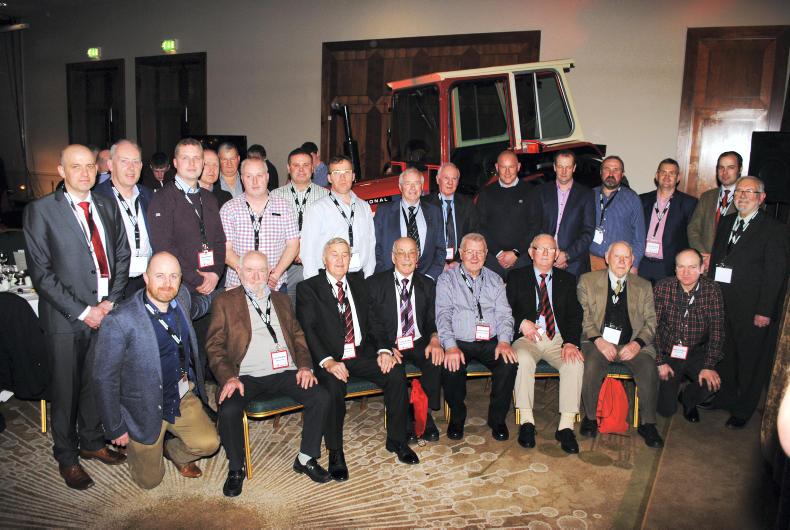
The dealer group, past and present, who attended the Fingal Vintage Society IH Commemoration Evening.
Cyrus McCormick is recognised for inventing the reaper from his farm in Virginia, USA, in 1831, which was the springboard for a huge enterprise that was to dominate the US farm machinery market for many years. The company moved to Chicago towards the middle 1800s and established a factory in what is now one of Chicago’s more plush business addresses in the city centre.
The factory was one of the casualties of the famous Chicago Great Fire in 1871, when Cyrus McCormick was then living in New York as a wealthy businessman. He did consider not re-building the Chicago reaper factory, but is reported to have changed his mind on his wife’s advice. He had the buildings insured and was funded to rebuild the enterprise and went on to greater success.
Birth of a brand
Cyrus McCormick was getting others to manufacture some of his machinery and in the early 1900s had bought a number of companies. His son, who was then in charge, set about merging the McCormick name with Deering, Milwakee, Champion and Plano machinery brands under a single name and so International Harvester was born.
The evening was compered by Michael Moroney, Irish Farmers Journal, who gave an overview of the IH experience. He noted that the IH brand was on sale in Ireland during the early 1900s, supplied to Irish farmers from the company’s UK base on City Road, London.
One year later, in 1917, International Harvester was the first tractor maker with its 8-16 to produce a power-take-off drive for a farm tractor, replacing the need for a separate engine to drive some of the then tractor-drawn machinery
IH had its Mogul tractor on display at the Spring Show in Dublin in 1916 with the company address given as Finsbury Road, London. In the US, these tractors were sold as Mogul under the IH brand and as Titan when sold at Deering dealerships.
This was because IH, which owned both, had two dealerships in most rural US towns and there were concerns about monopolies from the US government. This makes us realise that dual branding of tractors as we see today with some Case IH and New Holland models, is not a new phenomenon – it’s been around for more than 100 years and was started by Cyrus McCormick in the early IH days.
One year later, in 1917, International Harvester was the first tractor maker with its 8-16 to produce a power-take-off drive for a farm tractor, replacing the need for a separate engine to drive some of the then tractor-drawn machinery.
This was followed by the Farmall models, of which there were many. These were designed to compete with Henry Ford’s Fordson, which was growing in popularity for its light weight and good power-to-weight ratio. IH boasted then that it could sell a Farmall tractor for $700, which was a significant price reduction on the price of the Mogul models.
IH opened its own Dublin office in 1932 in Leinster Street, from where it continued to supply dealers across the country. We have few records of the dealers for IH at that time, while the company continued to supply a number of the Farmall models, which were first introduced in the US market in 1927.

As the night came to a close, Fingal Vintage Society chair Charles Hutcheson (centre) raise his Case IH hat along with those of Cormac and Niall McCartney of Mid-Louth Garage and all present to toast the IH tractor range.
By 1947, Wicklow brothers James, Harry, Tom, Gordon and Richard Saville established JH Saville Ltd in Dublin to import the IH range into Ireland. James Saville had worked in England during the 1940s selling IH construction machinery.
Landmark
They established what was to become one of the country’s landmark farm machinery businesses at Harvester Corner in Santry, Dublin, and put the IH brand firmly on the map in Ireland. Sales of farm and construction machinery increased and at one period they also sold some of the US-built IH trucks.
They carried out some early tractor assembly and opened branches in Kilkenny and Belfast. Later, they also established machinery dealership businesses in the UK. Small square baler sales of the IH B45 and B46 were huge. The B250 and B275 tractors were also popular in Ireland.
When Savilles closed in 1980, IH opened a new Irish office in Drumcondra, Dublin, and at that stage there were 29 IH dealers in the Republic of Ireland. That was also the year that IH was starting to show financial problems in the US, where the company experienced a huge workers’ strike that is reputed to have cost over $600m or the equivalent of $2bn today.
As a result, IH factories were being closed. By 1984, the entire farm machinery division was sold to Tenneco, the conglomerate that already owned Case and had bought out David Brown some years previously. The new name was Case IH, which in 1999 became part of the CNH or Case New Holland Group under the ownership of the Italian-based Fiat organisation.
Dealers
The dealer changes from the merger of David Brown and Case in the earlier years were followed by further rationalisation and changes in both tractor models and dealerships across Ireland following the 1984 Tenneco takeover. There are many farm machinery companies, both past and present, that have at some stage represented the IH brand in Ireland, through more than 100 years of changes.
Representatives from some of these family businesses joined with the Fingal Vintage Society to commemorate the IH brand on the special night.
Dealerships
Today, the Case IH brand is represented by just nine dealerships in the Republic of Ireland. Among those who have a lengthy continuous service with the IH brand are Mid-Louth Garages, formed by Pat McCartney in Ardee, Co Louth, and now run by his sons Cormac and Niall, who were the co-sponsors of the Fingal Vintage Society night.
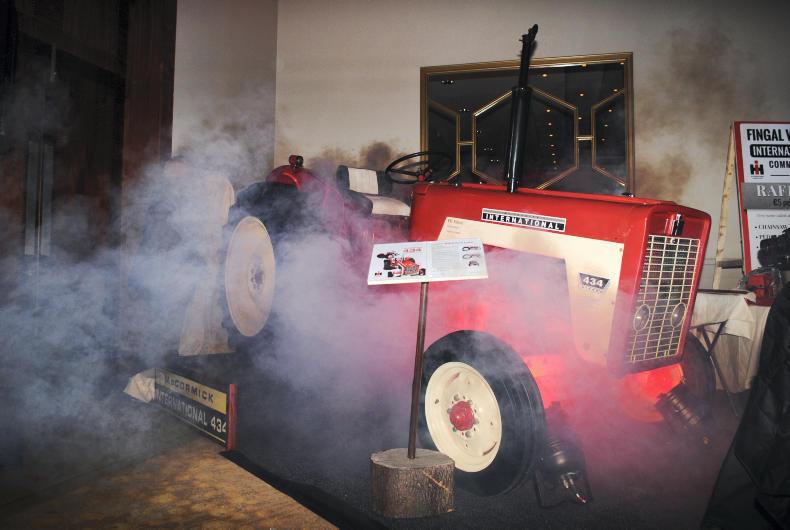
The IH 434, formerly owned by Anthony Campbell and now in the care of Sam Nelson, was one of the early 1960’s tractors unveiled on the night.
Former IH employee Philip Ponton provided an insight into IH during his 33 years with the company as a trainer and field manager. His fondness for the IH brand was clearly evident when he performed the commentary for the unveiling ceremony for the four special tractors in the room. These were the 1964 IH 414 owned by the Berrill family in Julianstown since new, the IH 434 formerly owned by Anthony Campbell and now in the hands of Sam Nelson as well as an IH 574 and an IH 784, both owned by the Hoey family.
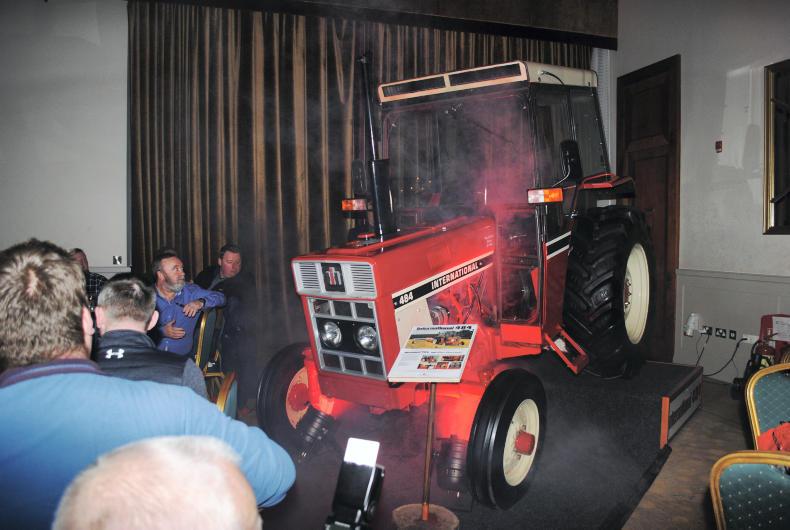
Michael Hoey’s IH 784 being unveiled to the rapturous applause of the attendance at the Fingal Vintage Society IH Commemoration Evening.
Michael Hoey of the Fingal Vintage Society, in opening the IH commemoration night, recalled his earliest memories in passing the rows and rows of International Harvester tractors at Saville’s Harvester Corner in Santry, Dublin, in his childhood days.
“The tractors were in rows in anticipation of a plentiful harvest, and they were easier to pay for back then,” he added. “The anticipation of a new tractor, the smell of the fresh paint and the sound of the engine brought people together on farms back in the 1960s and the Fingal Vintage Society commemoration evening aims to do the same for all tractor enthusiasts,” he added.
The Fingal Vintage Society’s commemoration event brought together vintage and classic tractor enthusiasts in a setting that provided an insight into how important the International Harvester (IH) tractor brand was in Ireland for many farmers and contractors.
The event included some rare video clips of early International Harvester history from the days of the McCormick era, right up until the 74 Series models. There was an overview of the history of IH both in the US and in Ireland, where the contribution of Cyrus H McCormick, the founder of the IH brand, was recognised for his Irish heritage – his ancestors came from Co Westmeath.

The dealer group, past and present, who attended the Fingal Vintage Society IH Commemoration Evening.
Cyrus McCormick is recognised for inventing the reaper from his farm in Virginia, USA, in 1831, which was the springboard for a huge enterprise that was to dominate the US farm machinery market for many years. The company moved to Chicago towards the middle 1800s and established a factory in what is now one of Chicago’s more plush business addresses in the city centre.
The factory was one of the casualties of the famous Chicago Great Fire in 1871, when Cyrus McCormick was then living in New York as a wealthy businessman. He did consider not re-building the Chicago reaper factory, but is reported to have changed his mind on his wife’s advice. He had the buildings insured and was funded to rebuild the enterprise and went on to greater success.
Birth of a brand
Cyrus McCormick was getting others to manufacture some of his machinery and in the early 1900s had bought a number of companies. His son, who was then in charge, set about merging the McCormick name with Deering, Milwakee, Champion and Plano machinery brands under a single name and so International Harvester was born.
The evening was compered by Michael Moroney, Irish Farmers Journal, who gave an overview of the IH experience. He noted that the IH brand was on sale in Ireland during the early 1900s, supplied to Irish farmers from the company’s UK base on City Road, London.
One year later, in 1917, International Harvester was the first tractor maker with its 8-16 to produce a power-take-off drive for a farm tractor, replacing the need for a separate engine to drive some of the then tractor-drawn machinery
IH had its Mogul tractor on display at the Spring Show in Dublin in 1916 with the company address given as Finsbury Road, London. In the US, these tractors were sold as Mogul under the IH brand and as Titan when sold at Deering dealerships.
This was because IH, which owned both, had two dealerships in most rural US towns and there were concerns about monopolies from the US government. This makes us realise that dual branding of tractors as we see today with some Case IH and New Holland models, is not a new phenomenon – it’s been around for more than 100 years and was started by Cyrus McCormick in the early IH days.
One year later, in 1917, International Harvester was the first tractor maker with its 8-16 to produce a power-take-off drive for a farm tractor, replacing the need for a separate engine to drive some of the then tractor-drawn machinery.
This was followed by the Farmall models, of which there were many. These were designed to compete with Henry Ford’s Fordson, which was growing in popularity for its light weight and good power-to-weight ratio. IH boasted then that it could sell a Farmall tractor for $700, which was a significant price reduction on the price of the Mogul models.
IH opened its own Dublin office in 1932 in Leinster Street, from where it continued to supply dealers across the country. We have few records of the dealers for IH at that time, while the company continued to supply a number of the Farmall models, which were first introduced in the US market in 1927.

As the night came to a close, Fingal Vintage Society chair Charles Hutcheson (centre) raise his Case IH hat along with those of Cormac and Niall McCartney of Mid-Louth Garage and all present to toast the IH tractor range.
By 1947, Wicklow brothers James, Harry, Tom, Gordon and Richard Saville established JH Saville Ltd in Dublin to import the IH range into Ireland. James Saville had worked in England during the 1940s selling IH construction machinery.
Landmark
They established what was to become one of the country’s landmark farm machinery businesses at Harvester Corner in Santry, Dublin, and put the IH brand firmly on the map in Ireland. Sales of farm and construction machinery increased and at one period they also sold some of the US-built IH trucks.
They carried out some early tractor assembly and opened branches in Kilkenny and Belfast. Later, they also established machinery dealership businesses in the UK. Small square baler sales of the IH B45 and B46 were huge. The B250 and B275 tractors were also popular in Ireland.
When Savilles closed in 1980, IH opened a new Irish office in Drumcondra, Dublin, and at that stage there were 29 IH dealers in the Republic of Ireland. That was also the year that IH was starting to show financial problems in the US, where the company experienced a huge workers’ strike that is reputed to have cost over $600m or the equivalent of $2bn today.
As a result, IH factories were being closed. By 1984, the entire farm machinery division was sold to Tenneco, the conglomerate that already owned Case and had bought out David Brown some years previously. The new name was Case IH, which in 1999 became part of the CNH or Case New Holland Group under the ownership of the Italian-based Fiat organisation.
Dealers
The dealer changes from the merger of David Brown and Case in the earlier years were followed by further rationalisation and changes in both tractor models and dealerships across Ireland following the 1984 Tenneco takeover. There are many farm machinery companies, both past and present, that have at some stage represented the IH brand in Ireland, through more than 100 years of changes.
Representatives from some of these family businesses joined with the Fingal Vintage Society to commemorate the IH brand on the special night.
Dealerships
Today, the Case IH brand is represented by just nine dealerships in the Republic of Ireland. Among those who have a lengthy continuous service with the IH brand are Mid-Louth Garages, formed by Pat McCartney in Ardee, Co Louth, and now run by his sons Cormac and Niall, who were the co-sponsors of the Fingal Vintage Society night.

The IH 434, formerly owned by Anthony Campbell and now in the care of Sam Nelson, was one of the early 1960’s tractors unveiled on the night.
Former IH employee Philip Ponton provided an insight into IH during his 33 years with the company as a trainer and field manager. His fondness for the IH brand was clearly evident when he performed the commentary for the unveiling ceremony for the four special tractors in the room. These were the 1964 IH 414 owned by the Berrill family in Julianstown since new, the IH 434 formerly owned by Anthony Campbell and now in the hands of Sam Nelson as well as an IH 574 and an IH 784, both owned by the Hoey family.

Michael Hoey’s IH 784 being unveiled to the rapturous applause of the attendance at the Fingal Vintage Society IH Commemoration Evening.
Michael Hoey of the Fingal Vintage Society, in opening the IH commemoration night, recalled his earliest memories in passing the rows and rows of International Harvester tractors at Saville’s Harvester Corner in Santry, Dublin, in his childhood days.
“The tractors were in rows in anticipation of a plentiful harvest, and they were easier to pay for back then,” he added. “The anticipation of a new tractor, the smell of the fresh paint and the sound of the engine brought people together on farms back in the 1960s and the Fingal Vintage Society commemoration evening aims to do the same for all tractor enthusiasts,” he added.










 This is a subscriber-only article
This is a subscriber-only article






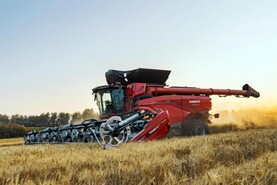

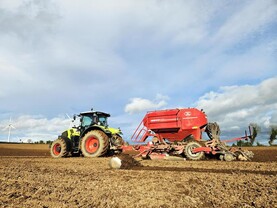
SHARING OPTIONS: